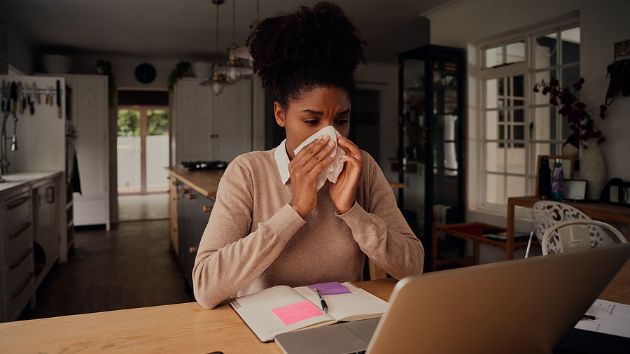
Living in Las Vegas, NV—where soaring temperatures and dust-filled, pollen-rich air are the norm—many residents rely on air conditioning to stay comfortable. At Simply Cooling, Heating & Plumbing, our expert AC repair services ensure that your system not only cools your home but also promotes a healthy indoor environment. Do you find yourself sneezing, wheezing, or coughing even when indoors? This could be a sign that your AC system is circulating allergens.
Air Quality & Allergens
Homeowners may not realize that the air quality inside their homes may be as problematic as outdoor pollutants. Over time, these pollutants can accumulate and lead to health issues such as allergies, respiratory problems, asthma flares, and other discomforts. Your indoor air may contain allergens such as:
- Tree Pollen
- Dust Mites
- Mold Spores
- Pet Dander & Fur
How Air Conditioning Affects Allergens
An efficient air conditioning system plays a key role in circulating indoor air, which can improve or worsen allergies, depending on several factors. When working correctly and maintained well, an AC can help filter out these allergens. However, without proper maintenance, your central air can circulate and redistribute allergens throughout your home.
The Role Of AC Filters
Your air conditioner filter is the first line of defense against indoor allergens. It’s crucial to choose a filter with a high MERV (Minimum Efficiency Reporting Value) rating, which indicates better filtration efficiency. Filters work by trapping particles like dust, pollen, and dander before they can enter your living space. To improve air quality, consider these filter options:
- HEPA Filters: According to the Environmental Protection Agency (EPA), capable of capturing up to 99.97% of airborne particles.
- Electrostatic Filters: Use static electricity to attract and trap particles.
- Pleated Filters: Have more surface area, which allows them to trap a larger volume of particles.
Spring Allergens’ Impact On AC Performance
March through May marks the worst allergy season for Nevada residents. These high pollen counts can significantly affect individuals with allergies, making it crucial to ensure your AC system is ready to handle the additional load of allergens. While ragweed is a significant pollen producer, spring in Las Vegas brings a surge in pollen from trees including:
- Mulberry
- Aspen
- Olive
- Maple
- Ash
- Oak
- Elm
- Cypress
- Willow
Proactive Measures During Peak Allergy Season
Spring allergy season can significantly impact your indoor air quality, but homeowners can take simple yet effective steps to create a healthier living environment. By making a few small adjustments, you can minimize the allergens that accumulate inside your home, helping you breathe easier and enjoy a more comfortable space. Consider:
- Changing Filters More Frequently: This can reduce the amount of pollen that circulates indoors.
- Scheduling Routine Maintenance: Ensure your AC system is performing optimally.
- Using Air Purifiers: Additional purifiers can help reduce airborne particles.
Why Regular AC Maintenance Matters For Allergy Sufferers
Without regular maintenance, an AC unit can become a breeding ground for mold and bacteria. This not only reduces the efficiency of your system but also recirculates allergens throughout your home. Hiring a Las Vegas HVAC specialist can help maintain a healthy indoor environment, by focusing on:
- Regular Cleaning: Cleaning and checking ducts to prevent mold growth.
- Coil Care: Ensure the AC coils are clean to maintain efficiency.
- Leak Checks: Fix leaks to prevent moisture build-up, which can lead to mold.
Preventing Mold Growth In AC Systems
Mold can thrive in the damp and dark components of your air conditioning system, turning it into an allergen generator. Mold spores can cause allergic reactions, such as sneezing and wheezing, when circulated throughout your home. You can help prevent mold growth in your AC by controlling moisture levels and maintaining your system with:
- Dehumidifiers: Use them in conjunction with your AC to reduce indoor humidity.
- UV Lamps: Install UV lamps inside the ducts to kill mold and bacteria.
- Inspections: Regularly inspect your system for signs of mold.
When Do Your Allergies Signal A Need For AC Repair Service?
If you notice an increase in allergy symptoms when using your AC, it might be time for a professional assessment. Whether it’s persistent sneezing, wheezing, or other symptoms, these could indicate underlying issues with your AC system. Over time, dust mites, pollen, mold, and other allergens may accumulate in your air conditioning unit. Look for signs such as:
- Odd Odors: A musty smell could indicate mold inside the AC.
- Unusual Sounds: Banging or clanking noises may suggest that parts need repair.
- Inefficient Cooling: If the system isn’t cooling as it used to, it might require servicing.
Simple Steps For Allergy Relief
Improving indoor air quality is essential for maintaining a healthy home, especially in Vegas where outdoor pollutants can easily find their way inside. By taking a few proactive steps, you can create a cleaner, fresher environment for you and your family. Try to:
- Optimize Ventilation: Open windows during low pollen times to improve air flow.
- Add House Plants: Introduce indoor plants known for air purifying, such as spider plants or peace lilies.
- Home Cleaning: Vacuum with a HEPA filter vacuum and dust regularly.
If you need additional help or suspect your HVAC system might be contributing to poor air quality, don’t hesitate to call a tech for expert assistance.
Get Cleaner & Healthier Air In Las Vegas Today
Ready to breathe easier in your Las Vegas home? Contact Simply Cooling, Heating & Plumbing for expert advice and reliable AC repair service in Las Vegas. Let us help ensure your system is running efficiently, contributing to better indoor air quality and reducing allergy symptoms. Trust our team to provide professional HVAC care and maintenance tailored to your needs.